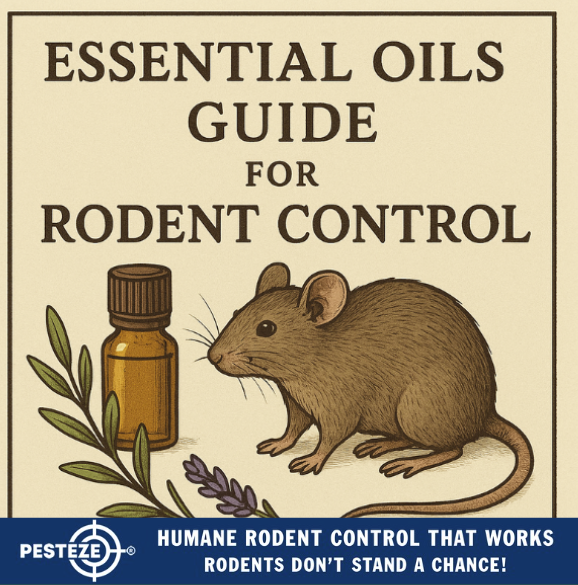ESSENTIAL OILS GUIDE FOR RODENT CONTROL

ESSENTIAL OILS GUIDE FOR RODENT CONTROL
SUMMARY
Rodents can damage property, contaminate food, and spread disease. Essential oils offer a safe, eco-friendly way to deter them. Discover which oils are most effective, how to apply them, and why they’re a natural alternative to harmful chemicals.
FEATURES
-
Peppermint Oil: Strong scent overwhelms rodents’ senses and keeps them away.
-
Eucalyptus Oil: Natural repellent that irritates rodents’ respiratory systems.
-
Clove Oil: Intense aroma disrupts nesting areas and deters gnawing.
-
Citronella Oil: Common insect repellent that also discourages rodents.
-
Tea Tree Oil: Antimicrobial properties reduce rodent-attracting odors.
-
Lemongrass Oil: Fresh citrus scent drives rodents from enclosed spaces.
GUIDE DESCRIPTION
Rodents are persistent intruders that can quickly become a serious problem for both homes and businesses. They chew through wires, damage insulation, contaminate stored food, and carry harmful diseases. While many property owners turn to traps or poisons, these methods can pose risks to children, pets, and the environment. Essential oils offer a safer, non toxic, and highly effective alternative for repelling rodents naturally.
Peppermint oil is the most widely recognized essential oil for rodent control. Its powerful, refreshing scent is overwhelming to rodents, making it difficult for them to navigate and communicate. Applying peppermint oil to cotton balls and placing them near entry points, pantries, or storage areas can create an invisible barrier that rodents prefer to avoid.
Eucalyptus oil provides another layer of defense. Its sharp aroma irritates rodents’ nasal passages and respiratory systems, discouraging them from staying in the treated area. This makes eucalyptus oil especially useful in attics, garages, or basements where rodents tend to nest.
Clove oil is an excellent solution for preventing rodent nesting. Its spicy, pungent aroma deters rodents from settling in hidden corners or chewing on materials. Spraying diluted clove oil in areas where gnawing is evident can help protect furniture, insulation, and stored items.
Citronella oil, typically used to repel mosquitoes, also helps discourage rodents. It masks the food scents that attract them while creating an environment they find uncomfortable. Similarly, tea tree oil works by eliminating the odors rodents rely on to locate food and shelter, while its antimicrobial properties reduce contamination.
Finally, lemongrass oil adds another effective layer of defense with its bright, citrusy fragrance that rodents strongly dislike. Used alongside other oils, it enhances overall effectiveness by covering different scent profiles.
When applied correctly with sprays, diffusers, or soaked cotton balls, essential oils provide a multi sensory deterrent that is safe, eco friendly, and humane. While they may require reapplication to maintain potency, they are an excellent option for proactive and chemical free rodent management.
- Aahna Barma


Comments 0